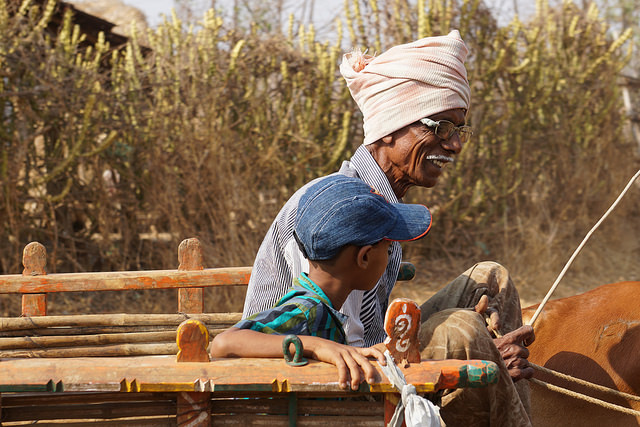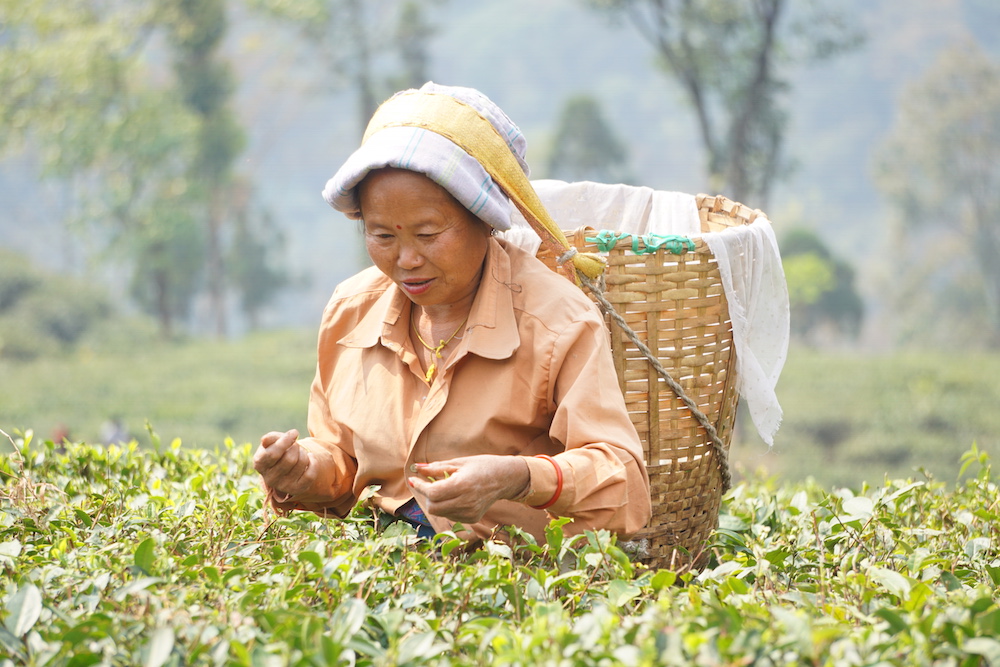
At a meeting in Maharashtra, Swades Foundation staff member Anand Patel sits across from a group of 20 farmers who recently started an experiment. Rather than each tending their own individual rice paddies, they work together on a 12-acre community farm with guidance from Swades Foundation, using drip irrigation to grow vegetables that fetch much higher prices than rice. While rice brings in only about $200 per acre locally, their recent harvest of bitter gourds yielded a peracre profit of about 200,000 rupees ($3,000).
When I ask if they prefer to farm on their separate lands or together, the farmers reply, almost in unison, "Ek saath" ("Together"). The system combines their strengths: Some are good at selling the vegetables in Mumbai; others are more skilled in farming techniques. They do have one collective goal: to bring their children back to agriculture. As in many rural Indian communities, the youth have fled to the cities to seek better wages. "But if we show them that [farming] can be a success, they will come back," one farmer says. The rest nod in agreement.
As Swades helps farmers realize their goals, it is also working with the young people keen on jobs beyond the farm. The foundation offers a two-month course at a local center that teaches practical skills: welding, electrical work, hospitality, and even banking and financial services. "In the villages, people tell us they don't have jobs. In the companies, we hear that they don't have enough skilled workers. So we're trying to bridge that gap," says Chandra Shekhar Gowda, Swades' director of economic development.
Swades is one of more than two million Indian nonprofits, but most others work in silos—health care, education, financial inclusion, and so on. In 2013, after more than two decades in media and film, husband-wife duo Ronnie and Zarina Screwvala reinvented their 12-year-old nonprofit, formerly called Society to Heal Aid Restore Educate, as Swades Foundation to consolidate work in these areas and promote a "360-degree" model for philanthropy. Rather than tackling a few specific issues separately, as their previous organization had done, Swades now works in 2,000 villages in Maharashtra across all the areas they believe are key to eliminating poverty—including water and sanitation, agriculture and livelihoods, health and nutrition, and community mobilization. The ambitious goal is, in five years, to raise one million Indians' incomes to more than $2 per day.
Before relaunching their organization, the Screwvalas spent considerable time examining India's social sector. "We traveled for one year around India to see what was being done, and we realized everyone was working in their silos," says Ronnie Screwvala. "No one was working in a consolidated manner. That was our 'aha' moment."
Working Within Communities
The Mumbai-based Screwvalas are not the first to adopt a holistic approach to community development. International initiatives such as the Millennium Villages Project—started in 2005 by economist Jeffrey Sachs to target specific villages in poor countries such as Kenya—have also applied integrated strategies. Ronnie says he is unfamiliar with Sachs' work but suggests that Swades is likely better able to understand the needs of the people it serves because it is homegrown: The Screwvalas are not international development experts but Maharashtran residents; they established Swades with their own funds, not aid money.
Zarina notes, however, that they did draw inspiration from BRAC, the large Bangladeshi nonprofit, and its success in supporting community work that addresses many interrelated problems together. "[T]here's so much self-generation of income in that system and it's at scale, covering various issues, and they have a 'whatever it takes' approach," she says.
Vineet Rai, CEO and founder of Aavishkaar, a Mumbai-based impact investing firm, says this holistic method of fighting poverty makes sense. "It is an excellent articulation of what one must do to impact community as a whole," he says. The approach—also employed by other Indian NGOs such as Pradan, Gram Vikas, and Payir—is "very similar to Gandhian philosophy of impacting the unit and working around key areas," he adds. What the Screwvalas hope they add to this model is a focus on efficiency and adaptability derived from their business background. They want to ensure that communities, like successful enterprises, ultimately can keep themselves out of poverty without relying on outside funding or support. While some other Indian NGOs draw inspiration from their founders' corporate backgrounds, Swades is relatively unique in combining the business and 360-degree mind-sets. The Screwvalas believe they are well-placed to do so because unlike most NGOs, Swades currently runs entirely on their personal funds, giving them an unusual degree of flexibility in directly managing and experimenting with their model.
The Screwvalas have visions of expanding Swades across India—which will require them to bring on additional funders and therefore give up some management control. They will conduct a quantitative impact assessment of Swades' first five years after 2018. But for now, they are concentrating on 2,000 villages, or about 500,000 people, in Maharashtra's Raigad District, just south of Mumbai.
"[E]verything we do starts with surveying the community and asking if they're willing to pay for the services and contribute to the process," Zarina says. In Raigad, about 1,300 community volunteers—many of whom have benefited from Swades programs—support a team of 300 full-time Swades staff such as Anand Patel, who oversees Swades' programs that focus on helping people to earn a living.
After a career in corporate agricultural and agrotech companies, Patel wanted to do something "with meaning." To date, Swades has supported 2,300 homes in their efforts to raise chickens and produce eggs for the market—a simple, low-cost way to bring many farmers an additional revenue stream, he says.
One of these farmers is Leeawati Pandurang Sangle. Her family manages a vegetable farm in a small hamlet, Potner, but its yields are not enough to support them. So in 2017, Sangle elected to become a Swades "anchor" farmer: She rears chicks and sells them to other families in her village who rely on eggs for income. Families can earn 4 rupees (approximately 5 cents) per egg, which means that a small flock of chickens can bring in up to 200 rupees (or $3) a day.
Sangle's family had tried to rear chickens before partnering with Swades, but they did not know how to protect the chicks from heat and disease and lost a 300,000-rupee (about $4,500) investment when the chicks died. The Swades staff saw families like Sangle's struggle. "So we decided to invest in one anchor farmer who could then sell to nearby families, and she could answer questions and help them as well, if needed," Patel says. Once Sangle signed on with Swades, she received guidance on what to feed the chickens, how to control their temperature, and how to vaccinate them. She's now earning 20,000 rupees ($350) in 21 days from rearing chicks—and bringing a range of benefits to the community at large.
Filling in the Gaps
As part of its 360-degree approach, Swades focuses less on building new systems than on supplementing what already exists and working with government and private partners. This stands in contrast to some international holistic development projects that have drawn criticism for introducing wholly new interventions. Millennium Villages, for example, famously encouraged farmers in Ruhiira, Uganda, to grow corn, only to find that the local population was not interested in eating the unfamiliar crop. While many Indian NGOs partner with government—particularly in the government-dominated fields of health and education—collaborations like Swades' with the private sector are more uncommon and reflect its founders' corporate background.
To complement its skills-based training programs, Swades works with companies to guarantee employment to the programs' graduates. Starting at entry-level positions, these young people are able to earn 9,000 to 12,000 rupees ($130 to $180) per month in nearby Mumbai and Pune. Additionally, the multinational bank HSBC's five-year Skills for Life initiative has given the foundation a 500 million rupee ($7.4 million) grant to facilitate skills training and employment for disadvantaged youth. Aloka Majumdar, head of corporate sustainability at HSBC, calls Swades' approach "a unique one, and an opportunity to create meaningful impact in a specific geography and completely transform the lives of communities they serve."
Swades also works within and builds on existing government structures in areas it deems fundamental to empowering whole communities, such as education and health care. Swades staff members help train teachers, secure classroom resources, and monitor students' health. And because vision care is poor in rural India, a Swades-run mobile eye clinic offers free screenings, surgeries, and eyewear. So far, they've screened more than 200,000 people, and nearly 40,000 have received glasses. Swades also gives a cadre of 970 community health workers a small honorarium to provide basic medicines and first aid, maternal and infant health care, and referrals to government-run health centers. One community health worker says that she does the work, though it hardly pays, because she wants to serve her village. "If someone comes to us when they're sick, and we help, give them medicine, take care of them, it makes them happy, and that makes us happy."
"Government is not there to work with the community," Ronnie says. "They're good at doling out grants and schemes. When we are taking on a hands-on approach, engaging with the community, that's actually where the implementation is."
For the Screwvalas, the main challenge is deciding how Swades will make its eventual exit—a move they believe necessary to ensure that communities ultimately can sustain themselves without outside aid. Planning an exit is vital, they say, because too often organizations instead create systems that make communities reliant on continual assistance. "We haven't decided exactly what that exit will be like," Zarina says. "We may need to continue to do assessments in these communities. Or it's like a franchise model where you continue to do spot checks from time to time, but it's run by someone else, not you." Some programs, Ronnie says, may need continued support and care. "This is something you can't template. It's all work in progress."









